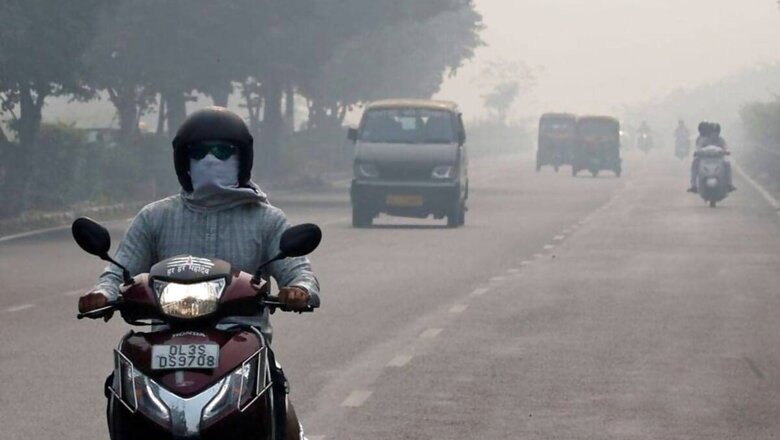
views
A new analysis of more than 3,000 counties in the US suggests that people with long-term exposure to PM 2.5 may be more likely to die from COVID-19, leading to increased concern about the trajectory of the disease and its fatality rate in parts of north India battling alarmingly high levels of air pollution. Though worried as cases in the Indian capital and its suburbs spike, pulmonologists here said a causal link between fine particle pollutants (PM2.5) and COVID-19 mortality has not yet been established. The US study, published in the journal Science Advances on Thursday, assessed the impact of long-term exposure to air pollution on COVID-19 death rates in 3,089 counties in the US.
The researchers, including Xiao Wu from Harvard University, found that chronic exposure to PM2.5 pollutants — tiny particles in the air that are two-and-a-half microns or less in width — is linked to greater county-level COVID-19 mortality rates. Dispelling some of the panic, experts here said the biological reasons for high rates of COVID-19 infection and deaths in places with high PM2.5 levels are yet to be understood.
"It is not proven currently that PM2.5 levels directly increase chances of infection or death," Piyush Goel, a pulmonologist from Gurgaon's Columbia Asia Hospital told PTI. Goel explained that PM2.5 particulate matter consists of water vapour, dust particles, and pollutants, which may attach the COVID-19 virus and facilitate its airborne transmission.
"But this is only a school of thought and not confirmed," he cautioned. "There have been no studies published in India right now which proves this scenario, but this is possible," he added.
According to the pulmonologist, the health of patients who maintained "somewhat stable" chronic lung conditions can become unstable due to the changing season and rising pollution levels. "And if these patients get lung infection, it will be a more serious complication. The criticality will be high," Goel said.
He said exposure to high levels of pollution can lead to chronic lung disease and also hamper lung development in infants and toddlers. "There are several studies backed by the World Health Organization which show that this may impact brain development also, and it could lead to lung cancer as well," Goel said.
"From children to full-grown adults, air pollution affects everyone in India, but how COVID-19 impacts people exposed to these conditions individually is too soon to tell," he added. Delhi's air quality index (AQI) was 397 at 10 am on Thursday, when italso saw 6,715 reported COVID-19 cases, taking the infection tally to over 4.16 lakh.
The 24-hour average AQI in the national capital was 450, categorised as "severe" — the highest since November 15 last year when it was 458 — raising concerns on how this may impact the COVID-19 caseload. The National Centre for Disease Control (NCDC) had warned last week that Delhi may report nearly 15,000 COVID-19 cases daily in winter because of the prevalence of respiratory illnesses during this season that worsen the symptoms of the disease.
Commenting on the association between air pollution exposure and death from COVID-19, Anurag Agrawal, director of New Delhi's CSIR-Institute of Genomics & Integrative Biology (IGIB), said both factors can affect the functioning of the lungs and heart, and lead to death. "But whether the health risk from these is additive or greater remains to be seen," the IGIB pulmonologist told PTI.
The Harvard researchers noted that chronic exposure to PM 2.5 might cause overproduction of ACE-2 receptor proteins in the lungs, which the novel coronavirus uses to enter host cells. They believe prolonged exposure to air pollution might also impair people's immune system, compromising their abilities to fight off the novel coronavirus infection. "Chronic exposure to PM2.5 causes alveolar ACE-2 receptor overexpression and impairs host defences. This could cause a more severe form of COVID-19 in ACE-2-depleted lungs, increasing the likelihood of poor outcomes, including death," the Harvard scientists wrote in the study.
But they acknowledged that this is only a hypotheisis. Citing the limitations of their study, the researchers said they were unable to account for individual-level risk factors such as age, race, and smoking status as such data was unavailable.
"This approach leaves us unable to make conclusions regarding individual-level associations," the scientists said The Harvard scientists believe further research on how pollution and other factors may exacerbate COVID-19 symptoms and increase mortality risk is essential to guide policies and behaviour related to the pandemic. Agrawal added that pollution levels must be controlled even without considering its association with COVID-19.
"Irrespective of the mathematics, we must strive to bring air pollution down to improve health," he said.
Read all the Latest News, Breaking News and Coronavirus News here


















Comments
0 comment